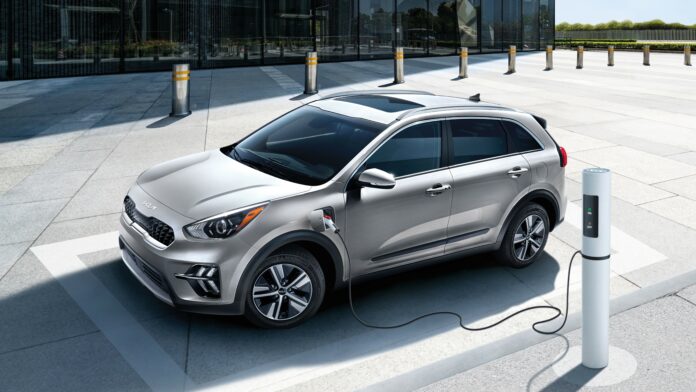Electric vehicle buyers can get up to $7,500 in federal tax credits this year, but not every EV or automaker qualifies for these credits. Word is spreading, however, about a loophole that may allow people leasing ineligible vehicles to grab a little of that cash.
Typically, consumers will buy an eligible car and then apply for the credit when filing their taxes. The IRS will use the vehicle’s VIN number to confirm whether or not the vehicle qualifies.
As of this year, the requirements for a vehicle to qualify are steeper than ever. They must be assembled in the US (not imported from foreign factories), with battery capacity minimums, battery minerals sourced from the US, price caps on the vehicle, and income caps for the driver. (See full requirements in our explainer.) The goal is to incentivize purchasing affordable, domestically created vehicles and only give the credit to those who need it.
That means brands like Kia, which manufactures its vehicles abroad—including the popular, sub-$40,000 Kia Niro EV—has no qualifying vehicles. The same goes for expensive brands like Rivian and Lucid, whose EVs are above the price caps.
There’s a sneaky way around this, however. Lease a vehicle purchased by a company that applies for a commercial credit.
A provision(Opens in a new window) in the Inflation Reduction Act of 2022 extends the credit to commercial vehicles. With an eye on incentivizing fleet electrification, its eligibility requirements are more lax. A commercial vehicle need only be an electric or fuel cell vehicle under 14,000 pounds with a battery capacity of at least 7kWh. There are no domestic assembly requirements or price caps.
But that doesn’t mean you need to own a business to get the money. Vehicles that claim the credit don’t have to be used as commercial vehicles, Insider reports(Opens in a new window). All that’s required is that a business purchases the cars, but that business could be a third-party leasing agent or even the financial arm of an automaker. A car company can buy its own vehicles, apply for the credit, and pass the savings on to its customers.
The automaker is not required to pass on those savings, but several are already doing so as a marketing tactic. Earlier this week, Lucid sent out an email advertising $7,500 total savings on a Lucid through this loophole. “Starting now, customers who lease any Lucid Air through Lucid Financial Services will receive an automatic $7,500 savings,” the email reads. “By taking advantage of this savings, customers get a lower monthly payment.”
Lucid advertising $7,500 in savings when leasing through Lucid Financial Services.
(Credit: Emily Dreibelbis/Lucid Motors)
The monthly payment on a Lucid Air is around $2,000, the website(Opens in a new window) says, so even with the credit it’s not exactly accessible. But other companies like Kia—which makes affordable and popular EVs like the Kia EV6(Opens in a new window)—are also cashing in on the credit and passing it to their customers.
Recommended by Our Editors
Even Kia’s plug-in hybrids qualify for a portion of the credit rather than the full $7,500. “In the case of the Niro PHEV, there’s about a $5,250 tailwind to the deal over the course of a 36-month lease, so keep an eye on that,” Kia’s Manager of Strategy and Planning, Steve Kosowski, tells PCMag.
While the loophole undermines some important aspects of the tax credit requirements for passenger vehicles, it may inadvertently benefit EV adoption by lowering prices on more vehicles. It also provides potential negotiation leverage for those looking to lease an EV from an automaker they suspect may be taking advantage of the credit.
Act quickly, though, because the US Treasury is reissuing its tax credit requirements in March(Opens in a new window), when some suspect(Opens in a new window) it will reduce the commercial credit from $7,500 to $3,500. If passing on commercial credit savings to consumers catches on, the feds may shut that down as well.
Treasury was supposed to issue its rules by Dec. 31, 2022, but since it didn’t, EVs that don’t meet the battery material sourcing requirements of the Inflation Reduction Act can claim the tax credit until the rules are released. That doesn’t sit well with Sen. Joe Manchin, a West Virginia Democrat, who introduced(Opens in a new window) legislation this week to set the compliance date at Jan. 1, 2023, meaning those who bought an EV this year may get less of a tax credit.
Get Our Best Stories!
Sign up for What’s New Now to get our top stories delivered to your inbox every morning.
This newsletter may contain advertising, deals, or affiliate links. Subscribing to a newsletter indicates your consent to our Terms of Use and Privacy Policy. You may unsubscribe from the newsletters at any time.
Hits: 0
















